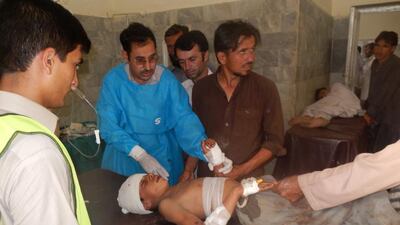Peshawar // A suicide bomber killed at least 23 people and wounded dozens more as they attended Friday prayers at a Sunni mosque in a north-western Pakistan.
The bombing took place in the village of Butmaina in the Mohmand tribal district bordering Afghanistan where the army has been fighting against Taliban militants.
“At least 23 people have been killed and 30 others wounded,” said Naveed Akbar, deputy chief of the district administration.
“A portion of the mosque and veranda collapsed in the blast and fell on worshippers. We are still retrieving bodies and the injured from rubble of the mosque building,” he said.
The bomber came in as Friday prayers were in progress and blew himself up in the main hall, Mr Akbar said.
The victims include four children aged 10 or younger, he said. A curfew has been imposed in the area.
There was no immediate claim of responsibility, but the Pakistani Taliban routinely attack soft targets such as courts, schools and mosques.
Shireen Zada, a resident who had prayed at another mosque nearby, said he heard the blast as he was walking home.
“I rushed to the spot and when I went inside the hall there was blood and human remains everywhere and people crying out,” he said.
“I brought my pickup truck, loaded three wounded and drove them to the hospital in Khar”, the nearest town, he said..
Prime minister Nawaz Sharif condemned the bombing. A statement from his office said “cowardly attacks by terrorists cannot shatter the government’s resolve to eliminate terrorism from the country”.
On September 2, at least 14 people were killed and more than 50 wounded after a suicide bomber attacked a court in the Pakistani city of Mardan in an assault claimed by the Jamaat-ul-Ahrar Taliban faction.
The group also said it was behind an attack on lawyers in Quetta, which killed 73 people on August 8, as well as the Lahore Easter bombing that killed 75 in Pakistan’s deadliest attack this year.
The attack in Quetta was also claimed by ISIL, which has been trying to make inroads in South Asia. Authorities in Lahore on Friday said four ISIL militants had been arrested while plotting attacks on government targets in the city.
They were seized in a raid along with 1.6 kilos of explosives as well as fuses and detonators, the city’s counter-terrorism department said.
“The terrorists had planned to kill officials on a large scale” and were about to launch their attack when agents acting on a tip raided their hideout near Lahore’s Moon Market, the department said.
Pakistan’s military this month declared that it had foiled ISIL’s attempts to establish operations in the country, saying it had arrested more than 300 militants and sympathisers including all but one of 20 core organisers.
“They tried to make an ingress, and they failed and they have been apprehended so far,” spokesman Lt Gen Asim Bajwa said on September 1.
Besides the Pakistani Taliban, Pakistan is already home to several militant groups including the Afghan Taliban, Al Qaeda and the Haqqani network.
The army launched an operation in June 2014 to wipe out militant bases in the north-western tribal areas and bring an end to an insurgency that has cost thousands of civilian lives since 2004.
Security in the country has since improved, with fewer attacks than in previous years.
According to data from the South Asia Terrorism Portal, 457 civilians and 182 members of the security forces were killed in Pakistan from January 1 to September 11, putting 2016 on course for fewer casualties than 2015.
Last year, the country recorded its lowest number of killings since 2007, when the Pakistani Taliban was formed.
* Agence France-Presse and Reuters

